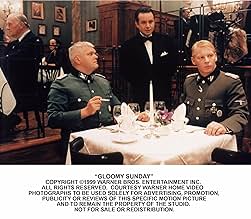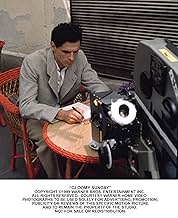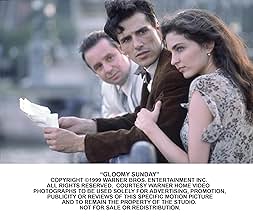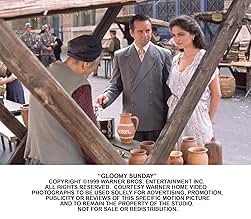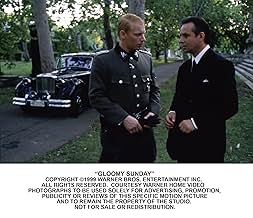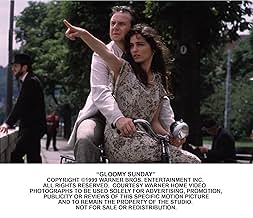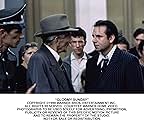VALUTAZIONE IMDb
7,8/10
8691
LA TUA VALUTAZIONE
Aggiungi una trama nella tua linguaFollows three men who are in love with a beautiful waitress during World War II: an intellectual restaurant owner, a mysterious musician, and an erratic businessman.Follows three men who are in love with a beautiful waitress during World War II: an intellectual restaurant owner, a mysterious musician, and an erratic businessman.Follows three men who are in love with a beautiful waitress during World War II: an intellectual restaurant owner, a mysterious musician, and an erratic businessman.
- Regia
- Sceneggiatura
- Star
- Premi
- 7 vittorie e 5 candidature totali
Recensioni in evidenza
10crisbob
Beautiful Budapest, end of the thirties. Lazlo Szabo a middle-aged jew Hungarian runs a chic restaurant with a beautiful waitress,Ilona who is also his mistress. One day they decide to hire a pianist, and it's Ilona who choose. And it's a good choice because the handsome young man, Andras, creates a wonderful mood on the premises. Little by little he falls desperately in love with Ilona and composes specially for her a song, very melancholic, and a bit misterious. He calls it " Gloomy sunday ". This song brings surprisingly a lot of suicides. The love-triangle functions pretty well until the time a german customer, Hans, who comes regularly in the restaurant falls in love with Ilona, without success.A few years later the german army invades Hungary, Hans is back as a highly placed officer and the jewish condition of Lazlo is going to complicate the lives of the four protagonists. This movie is a master- piece and I'd bet if the film had been produced in Hollywood with Stone, Douglas and Harrison Ford, directed by Cassavetes it would have gained several Oscars. It has all a movie fan can expect from a good film -and more. Beautiful scenery, very good story, marvelous music, talent of the actors, and even a bit of sex. I rarely see a picture twice on the same day. This time I did.
"Gloomy Sunday (Ein Lied von Liebe und Tod)" is a very mittel-European take on "Jules et Jim."
It has resonance with "The Pianist," but was produced in 1999 and is only being released in the U.S. now. Based on an urban legend grounded in fact it demonstrates how a piece of music can perfectly capture the zeitgeist of its times, so much so that it influences people's lives to end them. The original facts, with a list of recordings, are documented at www.phespirit.info/gloomysunday/ which is how I knew to find Marianne Faithfull's recording in my collection to play as I write this.
A love quadrangle starts off as an open, free-spirited affair between a jovial restaurant owner and his high-spirited, sensual hostess, becomes a complex three-some with a sultry composer, then an uptight tourist gets tangled in their lives. But this is Budapest 1933 - 1945, and the personal becomes the political, as the restauranteur is Jewish, the tourist transforms into an S.S. officer, and the composer's signature melody haunts them and the airwaves throughout a Europe falling like dominoes.
While there are lovely shots of the bridges and narrow streets of Budapest in a warm, lush cinematography, especially as seen on desperate bicycle rides (in dress and high heels no less), much of the movie takes place in the restaurant, so that the passage of time and the resulting changing stresses are marvelously shown by the actors' body language. Some of the coincidences are a bit thick, but the political commentary up to the present is effectively pointed.
The melody only gains in power throughout the film and is much more timeless in capturing the feelings of the time -- and any parallel experiences--than the pop or patriotic music Americans associate with the period. From the untranslated credits, it seemed that the closing version in English is Artie Shaw's, though the lead singer wasn't identified there. In the film, the lyrics are an after-thought to try and capture the music's meaning.
It has resonance with "The Pianist," but was produced in 1999 and is only being released in the U.S. now. Based on an urban legend grounded in fact it demonstrates how a piece of music can perfectly capture the zeitgeist of its times, so much so that it influences people's lives to end them. The original facts, with a list of recordings, are documented at www.phespirit.info/gloomysunday/ which is how I knew to find Marianne Faithfull's recording in my collection to play as I write this.
A love quadrangle starts off as an open, free-spirited affair between a jovial restaurant owner and his high-spirited, sensual hostess, becomes a complex three-some with a sultry composer, then an uptight tourist gets tangled in their lives. But this is Budapest 1933 - 1945, and the personal becomes the political, as the restauranteur is Jewish, the tourist transforms into an S.S. officer, and the composer's signature melody haunts them and the airwaves throughout a Europe falling like dominoes.
While there are lovely shots of the bridges and narrow streets of Budapest in a warm, lush cinematography, especially as seen on desperate bicycle rides (in dress and high heels no less), much of the movie takes place in the restaurant, so that the passage of time and the resulting changing stresses are marvelously shown by the actors' body language. Some of the coincidences are a bit thick, but the political commentary up to the present is effectively pointed.
The melody only gains in power throughout the film and is much more timeless in capturing the feelings of the time -- and any parallel experiences--than the pop or patriotic music Americans associate with the period. From the untranslated credits, it seemed that the closing version in English is Artie Shaw's, though the lead singer wasn't identified there. In the film, the lyrics are an after-thought to try and capture the music's meaning.
The charm of this film consist in the way to tell old things, in the description art of a well - known world.
"Gloomy Sunday" is a kind of Frankenstein's creature: pieces of "Lili Marleen", "Casablanca" or "The story of 1900", slices of Hungarian's atmosphere, Nazi ghost and menage en trois.
For all that, it is a good movie, his virtue is, in fact, just absence of originality. Like many other movies, the spell is result of a mysterious flavor who persist in your memory months, years and in special moment it saves the image of a sweet trip.
Undoubtedly, it is the story of a song, in same measure that the song is the only character. But, at second sight, it is a warm homage to Mitteleuropa, the gorgeous Kakania's spirit. The lost of youth and the last recollection's skin. The shadow of Goethe's "The Sorrows of Young Werther" is powerful and insidious.
A subtle wishfulness anatomy. And a song like his backbone.
"Gloomy Sunday" is a kind of Frankenstein's creature: pieces of "Lili Marleen", "Casablanca" or "The story of 1900", slices of Hungarian's atmosphere, Nazi ghost and menage en trois.
For all that, it is a good movie, his virtue is, in fact, just absence of originality. Like many other movies, the spell is result of a mysterious flavor who persist in your memory months, years and in special moment it saves the image of a sweet trip.
Undoubtedly, it is the story of a song, in same measure that the song is the only character. But, at second sight, it is a warm homage to Mitteleuropa, the gorgeous Kakania's spirit. The lost of youth and the last recollection's skin. The shadow of Goethe's "The Sorrows of Young Werther" is powerful and insidious.
A subtle wishfulness anatomy. And a song like his backbone.
...on why this film is doing well in communities unafraid to see subtitled films. For one thing, the beginning and ending create and resolve a compelling mystery (most of the film is a flashback). For another, you may or may not believe that a song could drive people to suicide, but you must admit it is a beautiful, sad and haunting melody. The story held my interest, as did the characters. The other obvious appeal was the opportunity to gaze endlessly at the incredibly lovely and angelic Erika Marozsán. I am female and straight and I could not get enough of looking at her; I could easily believe that she might inspire a piece of music that conveyed its composer's hopeless longing for her. (And he wasn't so hard to look at himself!) The only thing I couldn't figure out about Mr. Simpson's comments was what the film had to do with New Zealand. Now I know: nothing! :-)
According to the Los Angeles Times review of this film, "The song was actually composed in 1935 by Rezsö Seress, with lyrics by László Jávor, and did in fact accompany a number of suicides as Europe grew darker; Billie Holliday recorded a popular American version." So I guess it's not so far-fetched after all! Who knew?
According to the Los Angeles Times review of this film, "The song was actually composed in 1935 by Rezsö Seress, with lyrics by László Jávor, and did in fact accompany a number of suicides as Europe grew darker; Billie Holliday recorded a popular American version." So I guess it's not so far-fetched after all! Who knew?
"Gloomy Sunday" was a movie I happen to see by chance. Apparently my city is the only city in North America that is showing this movie. It is playing in one theatre in a small suburb. My father and I went to see this movie he wanted to see it because we are Hungarian and wanted to hear what kind of music would be played. To my surprise I found that I had actually enjoyed the movie. My expectations were low, only because I didn't have a clue as to what to expect but, I'm very happy I saw this film. It's one of the best films I've seen so far this year. The movie is about a few things. One of it's main story-lines concerns a love triangle concerning Laszlo (Joachim Krol), Ilona (Erika Marazan) and Andras (Stefano Dionisi). Laszlo owns a restaurant and Ilona is his girlfriend. Laszlo is hoping to have some music in his restaurant and hires a piano player, Andras. Andras likes Ilona. And Ilona it seems likes Andras. So he movie it seems will be a love story set during the beginning of WW2. But, there's also another story building. Andras has written a song called "Gloomy Sunday". He has written for Ilona. But soon the song becomes a hit. It's a beautiful song that seems to have a very strange effect on whoever listens to it. Soon afterwards people are committing suicide. And here we have a case of fact stranger than fiction. For it is this part of the story that is actually true. "Gloomy Sunday" is based on this story with the love theme used as a backdrop. I don't know if or when this movie will be wider release in North America. But I hope people will go see this movie. In fact though I doubt that people from this country have even heard of this movie. Here is a movie that NEEDS to be better known. It is a small gem. *** out of **** or a 7\10.
Lo sapevi?
- QuizWieck, the Nazi played by Ben Becker, is a fictionalized SS Col. Kurt Becher, who was acquitted in Nuremberg of war crimes and who ended up the richest man in Germany.
- BlooperAt a movie theater, the trio watches a newsreel that declares that the song "Gloomy Sunday" "drove 157 people in Hungary to suicide in the past eight weeks." It's unknown whether that statement ever actually appeared in a German newsreel during the war. There is no evidence that the song ever actually drove more than a handful of people--if any--to suicide.
- ConnessioniFeatured in Die Männer vom K3: Jugendliebe (1999)
- Colonne sonoreSzomorú Vasárnap/Gloomy Sunday
Music by Rezsö Seress
Lyrics by László Jávor
English lyrics by Sam Lewis (as Sam M. Lewis)
Akla Musikverlag Berlin
I più visti
Accedi per valutare e creare un elenco di titoli salvati per ottenere consigli personalizzati
- How long is Gloomy Sunday?Powered by Alexa
Dettagli
Botteghino
- Lordo Stati Uniti e Canada
- 585.604 USD
- Fine settimana di apertura Stati Uniti e Canada
- 7102 USD
- 22 giu 2003
- Lordo in tutto il mondo
- 646.532 USD
- Tempo di esecuzione1 ora 52 minuti
- Colore
- Mix di suoni
- Proporzioni
- 1.85 : 1
Contribuisci a questa pagina
Suggerisci una modifica o aggiungi i contenuti mancanti

Divario superiore
What is the Spanish language plot outline for Gloomy Sunday - Ein Lied von Liebe und Tod (1999)?
Rispondi

